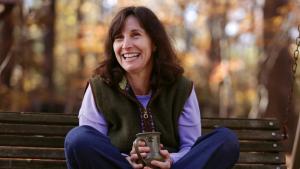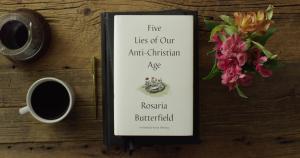Several weeks ago, while browsing at my local public library, I came across Rosaria Butterfield’s new book, Five Lies of our Anti-Christian Age. I hadn’t heard of it. But like so many other evangelicals, I had heard of Butterfield.

I read The Secret Thoughts of an Unlikely Convert: An English Professor’s Journey into Christian Faith (2012), her popular conversion narrative, and listened to her narrate her account of the winsome, generous Rev. Ken and Floy Smith, of persistent questions, of a love for the Bible that wooed her out of her previous life and into the new birth of faith. While I didn’t love that she felt she had to abandon her professorship at Syracuse, her scholarship in women’s studies and literature, and her feminism to quickly marry a man and begin homeschooling, I still found her story to be persuasive and welcome. While there are many Christians in academia–as the Conference of Faith and History and the Anxious Bench attest–it was nonetheless encouraging to hear of a brilliant scholar being captivated by the faith not just personally but intellectually. I felt similarly about religious historian Molly Worthen’s recent conversion, her tender earnestness an endearing reminder of the love and call of Jesus.
In her follow-up book, The Gospel Comes with a Housekey (2018), Butterfield pressed against the insularity and sterility of nuclear-family Christianity, arguing that the Church should adopt the type of open, radical hospitality as the gay community had. Prior to her encounters with the Smith family and subsequent conversion, Butterfield thought Christians “seemed like a small-minded, uncharitable, immoral bunch.” By contrast, she explains, “I learned in [lesbian] community about how to shore up a distinctive culture within and live as a despised but hospitable and compassionate outsider in a transparent and visible way.” Christians should do the same. “Radical ordinary hospitality,” as she describes it, “characterizes those who don’t fuss over different worldviews represented at the dinner table…it doesn’t get dug in over politics or culture or where someone stands on current events.” The Gospel Comes with a Housekey certainly belies Butterfield’s conservatism–she is Reformed and complementarian– and also hints at an adversarial stance. Even back in 2018 she wrote, “the male/female binary is essential to personhood,” that “God gives men and women distinct roles and tasks based on the sexual differences.” Still, though Butterfield acknowledges the difference between “acceptance and approval,” and maintains the needs for Christian repentance and obedience, the book is a charge to openness and kindness to neighbors of all kinds. It was a helpful intervention, and one endorsed by Aimee Byrd, Russell Moore, Sam Alberry, Melissa Kruger, Ray Ortland, and others.
I was expecting Five Lies of Our Anti-Christian Age to be similar. It’s not.

As issues of gender and sexuality have moved to the forefront of the evangelical culture wars, the conversation has become increasingly strident, even hysterical. Five Lies, published by Crossway, is an expression of this sort of reactionary, even martial, orthodoxy– one aimed at women in particular. (See the cover!) Butterfield is telling women in no uncertain terms that yes, the righteous are few and they (we!) have reason to be afraid. As Kevin DeYoung, one of the few prominent endorsers, opens the Foreword: “The devil is a liar…If we listen carefully we may detect his slithering speech in Christian books and blogs, even from pastors and churches.” Butterfield sees the church involved in a “civil war,” deeply under threat, particularly to “our nation’s reigning idol, a formidable monolith represented by the letters LGBTQ and the symbol +,” (which, in its phrasing, seems to be a veiled reference to the Antichrist). It’s harsh language.
Beginning with an elaborate invented nightmare in which a Christian mother goes to the grocery store and is confronted by the San Francisco Gay Men’s Chorus and a clerk shouting “your heteronormativity abuses me!”, Five Lies rests on the alarming presumption that “we all live in Babel now.” As a (very fair) Christianity Today review put it, Butterfield’s latest is “less memoir, more direct assault.” She agrees. “Spiritual battlefields change. Since we do not want to die or be captured by the enemy, we better wake up.”
Almost all of the chapters deal with gender and sexuality in some way, the exception being Chapter 2 which tackles the “lie” that “Being a Spiritual Person is Kinder than being a Biblical Christian.” Chapter 1 tackles homosexuality, a subject about which Butterfield has credibility and, presumably, has nuance. Not so much. She calls her lesbianism a “lack of righteousness and a willful transgressive action,” one corrected in sanctification when she “embrace[d] her role as a godly woman” and married a man. She will later state: “Homosexual identity is incompatible with union with Christ…inherently pagan… a barren narcissism.” Chapter 3 takes on Feminism, Chapter 4 Transgenderism, and Chapter 5 Modesty.
The positions in the book are not shocking, nor that novel. What struck me throughout was Butterfield’s certain tone and the thinness of the arguments. There are few citations. It’s mostly op-eds, YouTube videos, and 17th century Calvinists. I’m serious.
The chapter on intersectionality, for instance, is five pages, and contains a scant 4 reference notes: one is Denny Burk’s blog, one an interpretation of Jean Calvin, a First Things article, and just one scientific journal–not the findings, but the title of the study, which addresses “rapid onset of gender dysphoria.” Serious claims are substantiated only by anecdotes. The exception here is the chapter on transgenderism, the issue Butterfield seems the most concerned with, which does engage more robustly with some literature and studies, though her priors curtail some research and the complexity of the subject.
I found the section on Lie #3: “Feminism is Good for the World and the Church ” particularly upsetting given Butterfield’s background and training in women’s studies. I looked up some of her previous work, including a deep reading of Marilynne Robinson’s Housekeeping in which she (then Rosaria Champagne) discusses “the claims that cultural hegemonies have over women’s bodies,” how women must be “conquered and raped in order to claim one’s ‘rightful place’ within culture.” (Champagne, Rosario. “Women’s History and Housekeeping: Memory, Representation and Re-inscription.” Women’s Studies 20. 3-4 (1992): 321-29). To then read in Five Lies that “A godly woman’s best defense against a potentially abusive husband [in submission] is church membership in a biblically faithful church where she is a member in good standing” is wild. Butterfield knows better than most how gender and power works. Which isn’t to say that she’d necessarily have to change her conclusions. I have no doubt she could make an informed, complex case for her position. Instead, that chapter cites no theory, no scientific studies, but rather: a 1668 treatise on repentance, Calvin, a psalter, the catechism, Kevin DeYoung, a podcast, and a long poem written by two missionary women. Unsurprisingly, one of the few works of history she notes is Kristin DuMez’s Jesus and John Wayne which she misreads at length and dismisses as a “bad idea,” even a “false interpretation.”
In Secrets, Butterfield admitted that post-conversion she “miss[ed] being in the company of risky and complex thinkers, people who are invested in our culture and who challenge me to think to the edges of my comfort zone,” adding, “where everybody thinks the same, nobody thinks very much.”
There are still flashes of that contrarian creativity in Five Lies, in the brief section about social media, but in the main, the book is a parody of sincere intellectual engagement. Perhaps it’s the audience. They don’t want a treatise on hegemony or a close reading of the history of sexualities. They want to hear why they are right–and right to be very, very afraid.
This leads to the question of endorsements. The book is extreme, even for mainstream conservative Christians, few of whom, (even those who advocated Butterfield’s previous books), signed on to champion it. Instead, endorsements come from conservative pastors, like Denny Burk, and right-wing personalities, like Megan Basham, most of whom share Butterfield’s frantic preoccupation with the “assault on biblical manhood.” It’s a marked change. Is it simply that complementarianism has become associated with patriarchy and abuse and no one wants their name on it? Or does it indicate that people felt this was not a edification project but more of an intellectual shill for a political agenda? Do we have a Metaxas situation on our hands?
One final question, and a sincere one, to bring us back where we began: Might the book betray Butterfield’s conversion? I don’t mean this as a dig at her sincerity or her salvation. I would never, and besides, who could know? But I’m thinking here of Luke Bretherton’s notion of conversions as a simultaneous turning back and turning towards, the balance of old and new. He writes, “a theology of conversion contrasts sharply with both reactionary and progressive ideas of change.” Five Lies is clearly reactionary. Butterfield insists it’s biblical. But is it Christian?
Not to me.












